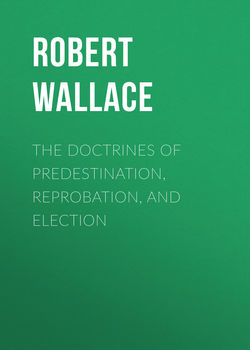Читать книгу The Doctrines of Predestination, Reprobation, and Election - Robert Wallace - Страница 6
PART I.—PREDESTINATION
CHAPTER III.
THE DOCTRINE OF PREDESTINATION CONSIDERED WITH REFERENCE TO ALMIGHTY POWER
ОглавлениеThe Power of God is held as supporting universal foreordination. As in the case of wisdom, God’s power must be recognised as infinite. It is true, indeed, that creation does not prove this, since it is limited, and no conclusion can be more extensive than the premises. But looking at the nature and multitude of His works, we cannot resist the conviction that there is nothing (which does not imply a contradiction) that is “too hard for the Lord.” He is infinite in power. But the power of God is guided by His wisdom and His love, just as is the power of a good and a wise king. In governing His creation, it stands to reason that He will govern each creature according to its nature—brute matter by physical law, animals by instinct, and man in harmony with his rational constitution. God does not reason with a stone, or plead with a brute; but He does so with man. “Come, now, and let us reason together, saith the Lord” (Isa. i. 18). It would be absurd to punish a block of granite because it was not marble, or to condemn the horse because he could not understand a problem in Euclid. To do so would be to treat the creatures by a law not germane to their nature. It is, indeed, a radical vice in Calvinistic reasoning that, because God is omnipotent, He can as easily therefore create virtue in a free being as He can waft the down of the thistle on the breeze. It is quite true that “whatsoever the Lord pleased that did He in heaven and in earth” (Ps. cxxxv. 6). But the question is—What is His pleasure in regard to the production of virtue? Is it a forced or free thing? Every good man will cheerfully ascribe to God the praise of his (the good, man’s) virtue. God gave him his constitution; God’s Spirit brought to bear on him the motives of a holy life. Had there been no Spirit, there would have been no holy life. Yet there is a sense in which the personal righteousness of the good man is his own righteousness. It consists in right acts, in right acts as regards God and as regards man. God told him what to do, and when he did it the acts became his acts, and were not the acts of God, nor of any other. When he does the thing that was right, he is commended—when he does not, he is blamed. Conversing one day with a Calvinistic clergyman, he intimated that a certain person had declared that the only thing stronger than God in the world was the human will. We remarked that we did not approve of such a mode of expression. And rightly so. It implies a confusion of ideas, confounding physical power which is almighty, and moral power, which is suasory and resistible. Stephen charged the Jews with resisting the Spirit. “Ye stiff-necked and uncircumcised in heart and ears, ye do always resist the Holy Ghost: as your fathers did, so do ye” (Acts vii. 51). Because they resisted him, would it be right to say that they were physically stronger than God? We replied to the clergyman that we supposed that the person who used the expression meant that God did not get people to do what He wished. The reply was that we were equally wrong. We then asked, “Do you think that God wishes people to keep His law?” He refused to answer the question. But why would he not? Aye, why? He was in this dilemma: If he said that He did wish them to keep His law, he would have been met by the question, Why then does He not make them do so? Everywhere the law is broken. If he said that God did not wish them to keep His law, would not this have been to put the Holy One on a level with the great enemy of man? This brings out the idea that whilst God is possessed of infinite power, in the exercise of that power He has respect to the constitution of man in the production of virtue. He does not override the constitution, and treat it as if it were a nullity. To do so would be absurd, for forced virtue is not virtue at all. God is all-powerful, but He is also all-wise.
